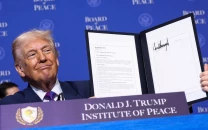UK voices concern over China's military drills near Taiwan
Statement comes after China launches Joint Sword-2024B drills which focuses on enhancing sea-air combat readiness

The UK has expressed concern over China's military exercises around Taiwan, warning that the actions could heighten tensions and risk dangerous escalation in the Taiwan Strait.
The statement comes after China launched the Joint Sword-2024B drills, which focused on enhancing sea-air combat readiness, targeting land and sea objectives, and asserting comprehensive battlefield control around Taiwan.
A spokesperson from the UK Foreign Office reiterated Britain's commitment to peace and stability in the region, emphasizing that the Taiwan issue must be resolved through dialogue between both sides of the Taiwan Strait without the use of force or coercion.
The UK does not support unilateral attempts to alter the status quo, the statement added, calling for restraint and caution to avoid further destabilizing actions.
China’s military drills, conducted by the People's Liberation Army (PLA), took place in areas north, south, and east of Taiwan.
The exercises included the deployment of naval, air, and rocket forces, marking a strong show of force.
According to Taiwan’s military, China flew a record 125 warplanes near the island on Monday, further escalating tensions.
Taiwan strongly condemned the drills, labeling them "irrational" and "provocative." President Lai Ching-te, in a recent speech, reaffirmed that China has "no right to represent Taiwan" and vowed to resist any attempts at annexation.
Beijing, which considers Taiwan an inseparable part of its territory, has long warned against international support for Taiwan’s independence efforts, asserting that such support would embolden separatist forces.
The UK's concerns over China’s military actions echo similar sentiments from other global actors. The European Union (EU) and Japan have also voiced alarm over the drills.
In a statement from the European External Action Service (EEAS), the EU urged all parties to exercise restraint and avoid any actions that could further escalate cross-strait tensions.
The EU reaffirmed its interest in preserving the status quo in the Taiwan Strait, calling for disputes to be resolved peacefully through dialogue.
In Japan, Prime Minister Shigeru Ishiba warned that Tokyo is closely monitoring the situation and is prepared to respond to any developments in the region.
He stressed that peace and security in and around the Taiwan Strait are critical to regional stability.
The UK's Foreign, Commonwealth, and Development Office emphasized the need for constructive dialogue between China and Taiwan, urging against any actions that could undermine peace in the region.
]In the UK Parliament, officials were questioned about how the country plans to work with international allies to de-escalate tensions.
Defense Secretary John Healey confirmed that Britain’s strategic defense review would include the Indo-Pacific region, highlighting the importance of international cooperation in maintaining stability.
Meanwhile, the United States also condemned China’s drills, with Pentagon spokesperson Maj. Gen. Pat Ryder describing the exercises as “irresponsible” and “destabilizing.”
The US reiterated its commitment to a free and open Indo-Pacific and confirmed its ongoing collaboration with allies to maintain peace across the Taiwan Strait.
Beijing continues to assert that Taiwan is a part of China, calling the military drills a “stern warning” to separatist forces.
Despite mounting international criticism, China remains firm in its stance, urging nations to avoid sending signals of support to Taiwan's independence movement.
The situation in the Taiwan Strait remains highly sensitive, with increasing global attention on how these military exercises might affect broader regional stability.



















COMMENTS
Comments are moderated and generally will be posted if they are on-topic and not abusive.
For more information, please see our Comments FAQ